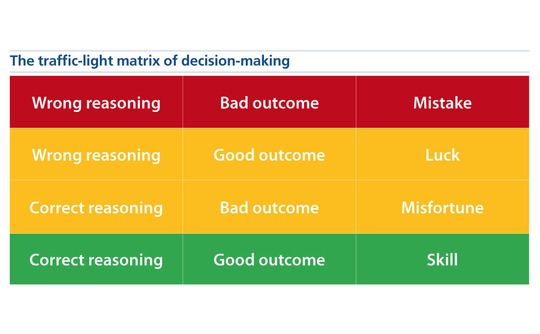
This article was paid for by a contributing third party.More Information.

The key to enhancing stock-picking skills

"For a comprehensive understanding of performance persistence… the actions of investors, investment management companies and portfolio managers need to be incorporated into the analysis"1
Academic research suggests that investors typically chase recent ‘winners’ in relative performance terms2, and that the goal of attracting new investors typically incentivises the absorption of greater risk by investment management3. Therefore, the actions of both of these groups have a direct impact on performance persistency, consistent with the quote above.
Clearly, the decisions of portfolio managers are pivotal and the concept of improving stock-picking skills is the subject of the final component of a paper recently published by the authors, entitled Navigating the obstacles to performance persistence in equity disciplines. Clearly, managers of equity long/short disciplines have additional scope to create value through stock selection, but the ability to generate alpha persistently remains elusive for many.
In assessing the ability of a portfolio manager, it is important not to become preoccupied with the outcomes of trades, but to analyse the factors that prompted the managers to make the decisions in the first place. Portfolio managers are human beings, and emotions, intuition and behavioural traits often bias rational thoughts. The relative performance of a portfolio over any given time frame only reveals whether or not share price movements have been favourable; it is not an effective measure of a manager’s skill and is certainly no indication of the ability of the manager to add value through stock-picking skill on a persistent basis.
Eugene Fama and Kenneth French, the renowned academics who designed the ‘three-factor model’ to describe stock returns, conducted an extensive study involving the analysis of returns of more than 3,000 equity funds over 22 years4. They observed that the sheer multitude of competing funds contributes to the role that chance plays in the generation of extreme returns (positive and negative). Moreover, the ‘arithmetic of active management’5 means that, for every manager benefiting from good luck, others – either individually or collectively – must suffer the same extent of bad luck. The authors conclude that failure to distinguish between luck and skill accounts for the lack of consistent alpha generation on the part of managers of equity-based disciplines.
Turning a luck-based venture into a skills-based activity
For our purposes, it is helpful to think of a skills-based activity as one that it is possible to deliberately lose at (for example, chess). Conversely, in games of luck, it is possible to play recklessly (for example, betting on an outside chance), but winning big remains a possibility, so losing is not assured.
Consequently, since most fund managers occasionally experience significant underperformance when they are trying to win, it must be equally possible that they could substantially outperform if trying to lose. As such, asset management can largely be a game of luck, but we believe it is possible to shift the emphasis to ensure that it is predominantly a skills-based activity, behavioural biases and emotions notwithstanding.
The number one requirement is to practice with the deliberate goal of getting better; something best achieved in conjunction with a performance coach to ensure honest reflection and meaningful analysis of decisions.
On a one-on-one basis with their performance coach, portfolio managers need to be able to map all of their decisions on a matrix in accordance with their rationale for trading and the outcome of the trade. Clearly, objectivity is essential as there is no hope of generating any improvement if all successful trades are attributed to skill and all unsuccessful outcomes are dismissed as misfortune.
Coaching is therefore a fact-finding process that is exacting and challenging. Most managers have little idea of the real attribution of their returns (the factors that influence where they make and lose money), but there is usually a discernible pattern involving the following variables:
- Holding period
- Market cap
- Catalyst for idea generation (sell-side analysis, technicals, etc.)
- Frequency of meetings with company management
- Emotional attachment or intuition
Once all of the trades have been correctly mapped, the thought process behind the decisions – good and bad – should be analysed. This helps managers to learn from their mistakes and recognise their strengths. Following these simple steps should ensure that, with the passage of time and continuous feedback and coaching, more decisions move from the top half of the matrix to the bottom.
Although it is tempting to ignore instances of skill in the review process (‘no problem there!’), we believe the key to replicating a good decision is to be fully aware of the thought process behind it. Mistake mitigation in isolation merely has the capacity to turn an average investor into an above-average investor; it is only in conjunction with strength maximisation that the transformation to a top-decile performer can potentially be completed.
Conclusion
The purpose of coaching and feedback loops is to promote self-awareness. Memory is not an analytical tool, but for many fund managers it is the sole component of their review process. In almost every skills-based field, the top performers rely heavily on a coach to enhance their strengths and eliminate mistakes. There is no reason why coaches should not be used widely in fund management, other than it being a culturally unpalatable concept.
The ‘10,000-hour rule’6 suggests that the key to success in any field is time and practice. However, practising security selection on a daily basis, simply because that is what you are employed to do, merely ingrains behavioural biases and repeated mistakes into the process. In this respect, practice does not make perfect but permanent. Consequently, it is somewhat ironic that length of experience is seen to be such an important attribute in a fund manager.
The key to enhancing stock-picking skills is to practice with the explicit intention of improving. Working with a coach can be a painful and challenging process, but it is incredibly worthwhile. If a portfolio manager can improve their ‘hit rate’ from 50% to nearer 60%, it will go a long way towards endowing them with the skills required to generate sustainable alpha.
Finally, the obstacles to performance persistency are far from insurmountable, but this structural objective is only achievable through a rigorous and disciplined approach that is specifically designed to overcome these issues. The difficulty for many hedge fund providers is that meeting the challenges head on requires both sweeping cultural changes and additional dedicated resources. However, the ultimate reward should be increased client satisfaction and higher retention of assets – a prize worthy of the considerable endeavour involved.
1 Mutual fund performance and performance persistence: The impact of fund flows and manager changes, Peter Lückoff, 2011.
2 Mutual fund flows and performance in rational markets, Jonathan B. Berk and Richard C. Green, 2004.
3 Risk taking by mutual funds as a response to incentives, Judith Chevalier and Glenn Ellison, 1997.
4 Luck versus skill in the cross-section of mutual fund returns, Eugene F. Fama and Kenneth R. French, 2010.
5 A term coined by WF Sharpe in 1991.
6 Proposed in Outliers, Malcolm Gladwell, 2008.
Pierre Lagrange is a founder and senior managing director at GLG (part of Man Group). He is also chairman of Man Group Asia. In 1995, Pierre co-founded GLG Partners and now holds overall responsibility for global equities, including sector long-short and long-only funds.
Simon Savage is a risk specialist at GLG (part of Man Group). Simon joined GLG in 2004 and has focused on risk control in the GLG European Long Short Strategy as well as the GLG Global Long Short Strategy.
Opinions expressed are those of the author and may not be shared by all personnel of Man. These opinions are subject to change without notice. This material is for information purposes only and does not constitute an offer or invitation to make an investment in any financial instrument or in any product to which any member of Man’s group of companies provides investment advisory or any other services. Communicated by GLG Partners LP, which is authorised and regulated in the UK by the Financial Conduct Authority. In the US, communicated by GLG Inc., which is authorised and regulated by the US Securities and Exchange Commission. UK/13/0840-P
Read/download the article in PDF format
Sponsored content
Copyright Infopro Digital Limited. All rights reserved.
As outlined in our terms and conditions, https://www.infopro-digital.com/terms-and-conditions/subscriptions/ (point 2.4), printing is limited to a single copy.
If you would like to purchase additional rights please email info@risk.net
Copyright Infopro Digital Limited. All rights reserved.
You may share this content using our article tools. As outlined in our terms and conditions, https://www.infopro-digital.com/terms-and-conditions/subscriptions/ (clause 2.4), an Authorised User may only make one copy of the materials for their own personal use. You must also comply with the restrictions in clause 2.5.
If you would like to purchase additional rights please email info@risk.net